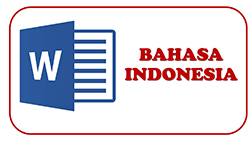Pengembangan Bahan Ajar Tema 1 (Indahnya Kebersamaan) Menggunakan Google Sites Kelas IV
Abstract
This study aims to discover how to develop pedagogical material using Google sites in the 4th grade. This study also aims to determine the results of the development of teaching materials related to the validity and student responses to the developed teaching materials, as well as to determine the implementation related to the use of google sites-based teaching materials. This research is a type of development research (R&D). The method used is the development model developed by Bord & Gall. The product developed in this research is a google sites website. This study uses an instrument using a questionnaire to determine the validity, student responses, and implementation related to the use of google sites. Based on the validation of media experts, media experts obtained an average percentage of 81%, material experts 94%, linguists 89% and can be categorized as "very valid". The results of student responses when the small group and large group trials were carried out obtained an average percentage of 80% and the use trial was 84% with the "very good" category. The results of the implementation questionnaire obtained a percentage score of 88% with the category "very good or no need for revision".
Downloads
References
Abdullah, F. S., & Yunianta, T. N. H. (2018). Pengembangan Media Pembelajaran Matematika Trigo Fun Berbasis Game Edukasi Menggunakan Adobe Animate Pada Materi Trigonometri. AKSIOMA: Jurnal Program Studi Pendidikan Matematika, 7(3), 434. https://doi.org/10.24127/ajpm.v7i3.1586
Ahmad Suriansyah. (2011). Landasan Pendidikan,. Comdes.
Bhagaskara, A. E., Firdausi, A. K., & Syaifuddin, M. (2021). Penerapan Media Webquest Berbasis Google Sites dalam Pembelajaran Masa Pandemi Covid-19 di MI Bilingual Roudlotul Jannah Sidoarjo. Jurnal Bidang Pendidikan Dasar, 5(2), 104–119. https://doi.org/10.21067/jbpd.v5i2.5541
Budi Harsanto. (2014). Inovasi Pembelajaean Di Era Digital,. Unpad press.
Bujuri, D. A., & Baiti, M. (2019). Pengembangan Bahan Ajar IPA Interaktif Berbasis Pendekatan Kontekstual. Terampil : Jurnal Pendidikan Dan Pembelajaran Dasar, 5(2). https://doi.org/10.24042/terampil.v5i2.3173
Chin-Fei, H., & Chia-Ju, L. (2012). Exploring the Influences of Elementary School Students’ Learning Motivation on Web-Based Collaborative Learning. US-China Education Review, 6, 613–618.
Fatmawati, Endang. dkk. (2022). Pembelajaran Tematik. Yayasan Penerbit Muhammad Zaini
Fani Yantik, Suttrisno, W. (2022). Desain Media Pembelajaran Flash Card Math dengan Strategi Teams Achievement Division (STAD) terhadap Hasil Belajar Matematika Materi Himpunan. Jurnal Basicedu, 6(3), 3420–3427. https://doi.org/https://doi.org/10.31004/basicedu.v6i3.2624
Ferismanyanti. (n.d.). Mengoptimalkan Pemanfaatan Google Sites dalam Pembelajaran Jarak Jauh. Kemdikbud.Go.Id.
Godfrey, Z., & Mtebe, J. S. (2018). Redesigning local games to stimulate pupils ’ interest in learning numeracy in Tanzania. International Journal of Education and Development Using Information and Communication Technology (IJEDICT), 14(3), 17–37.
HALAT, E. (2013). Experience of Elementary School Students with the Use of WebQuests. Mevlana International Journal of Education, 3(2), 68–76. https://doi.org/10.13054/mije.13.18.3.2
Hendrawati, R., Ismanto, B., & Iriani, A. (2021). Pengembangan Website Bimbingan Belajar di Sekolah Dasar. Jurnal Basicedu, 3(2), 524–532.
Hidasar, P, F., Bafadal, M, F., & Yani, A. (2021). Can Numeration Ability Be Enhanced Through Physical Activity of Traditional Tabak Games? Journal of Physical Education, Sport, Health and Recreations, 109(1), 28–34.
Hidayat, R. (2010). Cara Praktis Membangun Website Gratis. PT Alex Media Komputindo.
Indrawan, R. (2016). Metodologi Penelitian Kuantitatif, Kualitatif dan Campuran.
Irfan Maulana, M.Givi Efgivia, Y. (2021). Pengembangan Pembelajaran Online Learning dengan Desain Assure dan Pedati. Wdina Bhakti Persada.
Kosasih. (2021). Pengembangan Bahan Ajar. PT Bumi Aksara.
Lo, J. J., Chan, Y. C., & Yeh, S. W. (2012). Designing an adaptive web-based learning system based on students’ cognitive styles identified online. Computers and Education, 58(1), 209–222. https://doi.org/10.1016/j.compedu.2011.08.018
Muklis, M. (2012). Pembelajaran Tematik. Fenomena, IV(1).
Nafrin, I. A., & Hudaidah, H. (2021). Perkembangan Pendidikan Indonesia di Masa Pandemi Covid-19. EDUKATIF : JURNAL ILMU PENDIDIKAN, 3(2). https://doi.org/10.31004/edukatif.v3i2.324
Nurfatanah, N., Yudha, C. B., Marini, A., & Sumantri, M. S. (2021). Development of matemathic media games education based on e-learning in the Planting of Basic Concepts in Numeracy. Journal of Physics: Conference Series, 1869(1). https://doi.org/10.1088/1742-6596/1869/1/012127
Nurulwahida Azid, Rozita Hasan, Nurul Fazilah Mohamad Nazarudin, & Ruzlan Mohd Ali. (2020). Embracing industrial revolution 4.0: The effect of using web 2.0 tools on primary schools students’ mathematics achievement (Fraction). International Journal of Instruction, 13(3), 711–728.
Rikani, Istiqomah, & Taufiq, I. (2021). Pengembangan Media Pembelajaran Matematika Berbasis Google Sites pada Materi Sistem Persamaan Linier Tiga Variabel (SPLTV). Seminar Nasional Matematika Dan Pendidikan Matematika (6th SENATIK), 54–61.
Rohendi, D. (2019). Game-based multimedia for horizontal numeracy learning. International Journal of Emerging Technologies in Learning, 14(15), 159–170. https://doi.org/10.3991/ijet.v14i15.10679
Sanjaya. (2020). Tulisan Bersama Tentang Desain Pembelajaran SD. CV Jejak.
Sugiyono. (2013). Metode Penelitian Pendidikan Kuantitatif dan Kualitatif dan R & d. Alfabete.
Suprianto, A., Ahmadi, F., & Suminar, T. (2019). The Development of Mathematics Mobile Learning Media to Improve Students’ Autonomous and Learning Outcomes. Journal of Primary Education, 8(1), 84–91.
Suttrisno. (2021). Analisis Dampak Pembelajaran Daring terhadap Motivasi Belajar Siswa Madrasah Ibtidaiyah. Jurnal Riset Madrasah Ibtidaiyah (JURMIA), 1(1), 1–10. https://doi.org/10.32665/jurmia.v1i1.190
Suyahman. (2021). Media Pembelajaran PPKn SD. Lakeisha.
Swalaganata, G. (2018). Pengembangan Media Pembelajaran Game Aritmatika (GAMETIKA) Menggunakan Adobe Flash CS6. Jurnal Tadris Matematika, 1(1). https://doi.org/10.21274/jtm.2018.1.1.65-76
Tsekleves, E., Cosmas, J., & Aggoun, A. (2016). Benefits, barriers and guideline recommendations for the implementation of serious games in education for stakeholders and policymakers. British Journal of Educational Technology, 47(1), 164–183. https://doi.org/10.1111/bjet.12223
Zhang, L., Shang, J., Pelton, T., & Pelton, L. F. (2020). Supporting primary students’ learning of fraction conceptual knowledge through digital games. Journal of Computer Assisted Learning, 36(4), 540–548. https://doi.org/10.1111/jcal.12422





.png)










